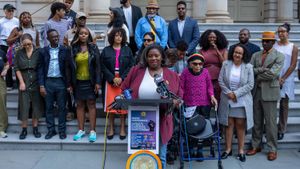The investigation surrounding the grim legacy of mother-and-baby homes and similar institutions across Northern Ireland is taking a significant turn. Recent findings indicate these facilities may have used private nursing homes to secretly house pregnant women and their babies—quite the shocking discovery for survivors and the broader community alike. The Truth Recovery Independent Panel, tasked with gathering evidence, is digging deep to unearth the dark history surrounding these homes, including Magdalene Laundries and workhouses.
Co-chaired by Professor Leanne McCormick, the panel has found preliminary evidence to suggest these private nursing homes served as clandestine locations where vulnerable mothers stayed, often leading to forced adoptions of their babies. The inquiry highlights the unsettling reality for at least 10,500 women believed to have been sent to these institutions, though incomplete records hint the actual figures could be much higher.
"We are increasingly aware of pregnant mothers spending time in these private nursing homes, and babies being adopted from there," Professor McCormick stated. This environment, she added, often kept mothers and their newborns out of sight, allowing authorities to remain ignorant of many situations. Decisions about the future of mothers and their babies were typically made behind closed doors, with mothers sometimes separated from their children during this tumultuous period.
Although the practice of using private nursing homes for childbirth was more prevalent before the establishment of the National Health Service (NHS) in 1948, it extended well beyond, continuing through the 1960s and 1970s. Between the 1920s and 1990s, over 10,000 women and girls passed through these institutions, many subject to abuse and harsh conditions.
Notably, two specific nursing homes have emerged during the inquiry: Antrim House in north Belfast and Bayview in Londonderry, both of which are now defunct. These mother-and-baby institutions, primarily managed by religious orders, were shrouded in secrecy and stigma, contributing to the distress experienced by many unwed mothers.
Caitriona Cunningham, one of the survivors who experienced the harsh reality of life within these institutions, expressed her feelings through creative outlets. She wrote and produced the play The Marian Hotel, which is set at Marianvale, one of these homes. Her lead character, Kitty, is based on Caitriona’s own story as she lived there from 1979 to 1980. She described her time as “very regimented,” adding, “everything was geared toward having your baby adopted.” Thankfully, she was one of the “few lucky people” who were able to reunite with her daughter after just three months. Yet, she felt the burden of keeping her past hidden, stating, "For years, I didn’t tell anybody I was in Marianvale." Now, driven by memories of countless other women affected, she has transformed her experience and emotions onto the stage.
At performances of her play, trauma support workers are present, providing resources for those who may be emotionally affected by the story. Patricia Byrne, the artistic director of Sole Purpose Productions, explained, “The play is very much a call to people who may have been impacted by mother-and-baby institutions to come forward.” The performance aims to break the silence surrounding these stories and reduce the stigma attached to those who suffered.
Another initiative, The Sunflower Project, showcases art and artifacts associated with the mother-and-baby homes at Linen Hall Library, Belfast. The exhibits include items like christening robes and personal letters, illustrating the themes of love, loss, and loneliness faced by mothers and their children. These stories are not just confined to Northern Ireland; they resonate across the island of Ireland, demonstrated by the recent film Small Things Like These, based on Claire Keegan's novel. The film, set around the 1980s, revolves around one man's growing awareness of the troubling happenings at a Magdalene Laundry.
Professor McCormick also urged those who might have witnessed events linked to these institutions to step forward. “We’re interested in anybody who had any connection with these institutions,” she said, beckoning neighbors, clergy, medical professionals, and tradespeople who might hold bits of the broader narrative. She noted the need for contributions from the Protestant community, as most witnesses have been associated with Catholic-run organizations.
The mother-and-baby homes served as oppressive institutions across Ireland, arising from societal views deeming pregnancy outside marriage scandalous. Over twelve such homes existed throughout Northern Ireland, some of which were notorious for the abusive treatment of women. At these facilities, residents were often subjected to evident neglect, harsh labor, and separation from their babies—experiences scarred by trauma and stigma.
The inquiry’s findings will feed directly to the public inquiry set up by the devolved government, aiming to investigate the widespread abuse and oppression alleged to have occurred within these institutions. Amid calls for justice, discussions are also underway about providing redress for survivors, including proposed compensation amounts of £10,000. Still, many survivors also express feelings of being “let down and forgotten” by the authorities.
It’s evident the memory of these institutions resonates with many, and the voices of survivors like Caitriona Cunningham echo through art, performance, and community gatherings. Their stories compel society to face the uncomfortable truths of the past, shining light on the resilience of women who endured unimaginable hardships and the necessity of healing moving forward.



